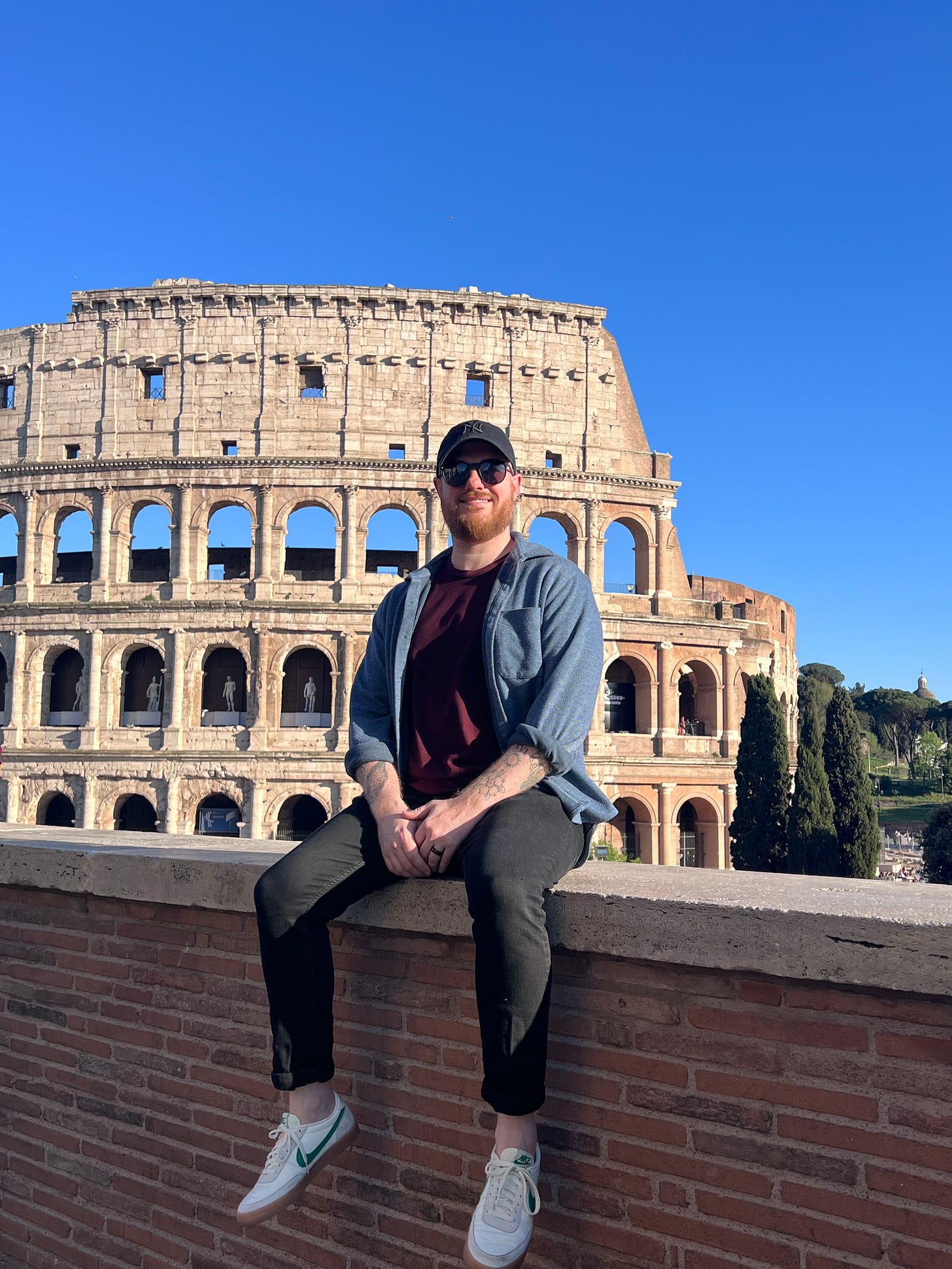Matt Snyder: On Becoming and Being a Therapist (Part 1)
Matt, a licensed clinical social worker, shares his journey from struggling with addiction to building a private practice, discussing career shifts, self-discovery, and meaningful work.
“I always tell people that the magic of therapy is you're always working on it even when you don't know that you're working on it.” — Matt Snyder
Hi therapisters!
I’d like to introduce you to today’s interviewee – Matt Snyder, LICSW (MA), LCSW (NC). Matt is a private practice therapist licensed in Massachusetts and North Carolina. We covered so much ground in our hour-long conversation that we split Matt’s interview into two separate posts. This is Part 1 of 2.
In today’s portion of the interview, Matt talks about his unexpected path to becoming a therapist and his perspectives on what it’s like to be a therapist. I really enjoyed my conversation with Matt and am so excited to share it with you!
You can find Matt on Psychology Today, Alma, LinkedIn, or his website.
Matt’s path to becoming a therapist
Sean McQuillan: Thanks so much for being here, Matt. To kick us off, tell us a bit about your personal story.
Matt Snyder: Sure. I grew up and went to college in South Carolina. I studied political science in undergrad and thought I was going to go to law school – as every political science major does.
After college, I took a gap year and started working in fine dining restaurants, which I fell in love with. I then got into a Title I teaching program (kind of similar to Teach for America, but on a smaller scale) that was based in Washington, DC, so I moved there for that. But then my own addiction struggles really started to show themselves.
I dropped out of the teaching program and went back to the restaurant industry, which was the safe haven for addiction problems. After struggling there for a couple of years, I hit rock bottom, which led me to start my own personal therapy and make some big changes.
I had an amazing therapist who really helped me turn my life around and find some direction. My new path led me to Boston for social work grad school where I got sober after my first semester. My first internship in grad school was focused on housing unstable youth (high school students specifically) and my second internship was working with the veteran population at a non-profit hospital program. I treated my second internship as somewhat of a long-form interview and was lucky enough to get hired there after graduation, which was the start of a rewarding (and challenging) five-year stint.
After my five years working with veterans, I transitioned into private practice full-time – and that’s what I’m still up to today.
Outside of work, I'm a big food guy. If I'm not in therapy or exercising, I'm probably cooking or watching food shows or traveling and trying new restaurants.
Sean: Thanks for sharing all that, Matt. It sounds like quite the ride. You mentioned you studied political science and thought about law school before entering the restaurant industry. When did you decide that going to grad school and becoming a therapist was the path you wanted to take?
Matt: I thought I wanted to go to law school until I took the LSAT (big laugh!). I was like, “Wow.” I thought I had always been a good student, but just didn’t do well on the test.
I had an internship my senior year of undergrad at a public defender's office, which is what I really wanted to do, and every single lawyer was like, “Don’t do it. Absolutely do not, man.” So heck, that probably impacted my LSAT preparation, as well.
But whether it was the public defender’s office or the Title I teaching program that I did in DC, there's always been a little bit of a social justice and helping component, which is ultimately what I've been attracted to. I actually tried social work school online for a very brief time during my stint in restaurants, but doing it all felt totally unmanageable given the state of my addiction and mental health.
Social work had always been in the back of my mind ever since I took an Intro to Social Work class in undergrad. But becoming a therapist only came to mind years later after I started my own therapy. Early on, it was always more like I just wanted to help, and social work seemed like a great place for that. Two years after I dropped my online program, I ended up at the Simmons full-time MSW program.

A career (and life) inflection point
Sean: Do you remember if there was a particular moment when you decided to make the jump and apply to grad school? Or was it more of a gradual decision-making process?
Matt: Yeah, there actually was a moment. So, we’ll get real personal for a second.
I almost died because of my addiction and mental health concerns. I was found on the side of the sidewalk – three or four minutes away from bleeding out. I had a really bad head injury from a serious fall and my blood alcohol content was 0.45, which is pretty lethal on its own. I woke up in the hospital and had no idea what happened.
I was 25 and financially independent at that point, but my parents were like, “You need to come home.” And that’s when I really started therapy.
I had dabbled in therapy before this point and was the “typical man” going to therapy. I went to the intake sessions, maybe a second session, vented out everything, felt good, and never went back. But this time around, I felt like I really had to do it.
I was lucky and got an amazing therapist that my parents had found for me. She was a social worker. It was a pretty short amount of time (like six or eight weeks going to therapy twice a week) that I decided that I was either going to be a therapist or go to culinary school. But I was so impacted by the work that I was doing in the therapy and decided to go all-in on that.
Sean: Wow, that’s an incredible story. It's wild that in only six to eight weeks, you went from such a low to “oh my goodness, therapy is helping me” to “this is what I want to do with my life.” But I also understand how your own therapy could’ve led to such a big realization about what you wanted to do in life – that’s how it worked for me, too. It must have been a crazy two months for you.
Matt: Crazy two months, for sure. I was also still recovering from a head injury, so I was probably sleeping 16 hours a day. My life was sleeping, therapy, and journaling about therapy. That was my life for those first two months. I was pretty immersed in it.
Sean: I mean, I was not anticipating the conversation to go here, but did I tell you about my concussion stuff that I'm going through now?
Matt: Yes, very briefly.
Sean: Well, it’s funny because I had mostly decided to go to social work school before my concussion happened, but it was actually during my recovery process when my choice really solidified.
Your life gets so small when you have a brain injury. You need to spend most of your time in low-stimulation environments with only a bad headache and your unfiltered thoughts. The early stages of my recovery actually ended up helping me clarify what I wanted my life to look like. There was no place to hide anymore.
Do you think your brain injury played a role in your decision-making?
Matt: Yeah, I think my forced reset was a huge piece. I was lucky enough to have a parental support structure that let me live at home and not work. It was like, “Therapy’s your job now.” At least for a couple of months. Slowing down made a big difference. I wasn’t out at bars until 5 AM anymore. Not working 16-hour days in a restaurant. It was slowing down and having to redefine what meaning was for me.
Being able to choose what is meaningful can be a little bit scary because you have to ask, “Who the fuck am I? And what the fuck am I doing?”
Honestly, I probably would have gone the culinary school route if I didn’t have the chance to really slow down. Many people don’t have the opportunity to just go to therapy, take a nap, and then journal about it for three hours. But it made a huge impact for me and really clarified things.
Sean: It sounds like a fully immersive hard reset.
Matt: It was like being in a residential program, but I was able to go home and sleep, you know?
Sean: Yeah, absolutely.
Perspectives on being a therapist
Sean: Shifting gears a little bit, I have some questions on what it’s like to be a therapist. We’ll start with – what would you say is your favorite part of being a therapist?
Matt: Hmm. I’d say – the moment when somebody brings something into therapy that they're excited to tell you about, especially when it’s been something you've been talking about for like six, eight months.
Sometimes you’ve been talking about it explicitly, sometimes covertly. I get so excited that something has landed for them and they've seen it happen in real time.
It’s not just an intellectual thought or something that we're contemplating in therapy, but like, “Oh, this happened and I'm excited to tell you about it.” It makes sense for them.
Sean: For sure. I've definitely had those light bulb moments when I've gone to my therapist and been like, “Hold up, you’re not going to believe this.”
Matt: Exactly. I always tell people that the magic of therapy is you're always working on it even when you don't know that you're working on it. You’re always processing under the surface. And then every once in a while, something happens in your life and you realize you’ve been working on this for a long time – and the rubber’s hitting the road.
Sean: I know it’s probably so different for every client you see, but I’m wondering how short- versus long-term therapy plays into this. I know some short-term therapy can be super valuable for folks, but I have to imagine that long-term therapy allows things to percolate over longer periods and at different rates, which probably influences the dynamics of these lightbulb moments, no?
Matt: Yeah, it definitely does. I have a little bit of an old-school mentality in terms of the timeline of therapy because I was in twice-a-week psychoanalytic therapy for six years, so I'm a big believer in the long-term sustainability of the relationship and the fact that deeper work takes time to build.
As you said, if people come in with really acute symptoms (like panic or anxiety symptoms), we attack those on a more short-term basis. But a longer course of therapy is often really helpful. Even if we are addressing something acute that resolves quickly, there's still so much depth to why those symptoms were occurring in the first place.
Private practice is a much different place than the hospital because I now get to see people for years, not just weeks or months. Last month was the second anniversary for some of my clients. Seeing their lasting change and feeling their lightbulb moments with them is pretty special.
Sean: What do you feel like people misunderstand about being a therapist?
Matt: That it’s directive advice-giving.
I hear people talk about their barriers around going to therapy as a client. People say, “I can handle my own problems. I don’t need somebody else to tell me what to do.”
I don’t tell you what to do.
If a client has explicit questions about something and asks, “What do you think I should do in this situation?” I'll give multiple perspectives for them to consider – and I may present a possible suggestion (while reiterating their agency) that either reflects their responses within the conversation or is based on recurring patterns that have come up in therapy.
But I never give directive advice on what I think you should ultimately do (unless there are safety risks involved). It’s because I’m not you and I don’t know what you should do. Nor do I think there is an objective ‘right’ answer. I think TV and movies have unfortunately built up this misconception.
Sean: And Instagram therapists.
Matt: TikTok now, too.
Sean: I'm showing my millennial side by not being on TikTok.
Matt: Me too.

The best therapists are __________.
Sean: Okay, here’s another fun one for you. Fill in the blank for us: The best therapists I know are ____________.
Matt: Authentically themselves.
I hate the Freudian, blank-slate approach to being a therapist. I think there's an inherent power differential in the therapist-patient relationship because the patient seeks help from them. So, I think therapists humanizing themselves through little moments of self-disclosure and lightness can help make the client feel comfortable enough to accept their own struggles. Little moments of self-disclosure can go a long way.
Sean: So, in your view, showing authenticity can help reduce any perceived power imbalance that is inherent in the relationship, maybe even especially for people like you mentioned before who are just expecting you to give them advice.
Because if you think your therapist is just going to give you advice, you (as the patient) have to believe that your therapist thinks they have the authority to do so, which signals an embodied power imbalance.
Matt: For sure.
Sean: And a note on self-disclosure, just because you’re (obviously) down to do this interview, which may or may not get seen by future clients of yours. How do you navigate self-disclosure in therapy?
Matt: It’s ironic because the most impactful therapy I’ve ever had was psychoanalytic therapy, which is notoriously against a lot of self-disclosure. In six years, I learned three facts about my therapist. But that kind of therapy worked for me at the time.
Before disclosing something, I was trained to always ask yourself, “Who is this for?” Are you attempting to soothe something in yourself or is this something valuable for the relationship? That’s the question that I lead with. But I also acknowledge that my views are a little different from my colleagues.
I believe there are forms of trivial self-disclosure that you lose nothing from, but the relationship gains a lot. Something like, “Oh yeah, I just went on a vacation to X or Y place.” Or something about a great meal I had last week. I know many therapists would never tell a client something like that. But for small things that can help humanize the relationship, I see no harm.
This is also why I feel like each therapist’s own therapy work is so important. If you ever feel like you're about to disclose something because it comforts you or your ego, hold off.
Overall, I think the topic of self-disclosure is much more open than our predecessors would like us to believe.
Sean: I’m so fascinated by this topic and there are a million more questions I want to ask you about it, but we’ll leave that for another time.
Let’s drop off here and pick back up for Part 2 of your story, which will come out soon!
Matt: Sounds awesome – looking forward to it.
And that’s it for today! I’m already excited to drop Part 2 of Matt’s interview.
A couple of fun things before we go:
#1 — A share, comment, or like goes a long way in the World of Substack (especially for a publication as new as therapisting). Any engagement is appreciated – let’s show Matt some love for his thoughtfulness and honesty!
#2 — Is there anyone you have in mind who would find our work interesting? (like that cousin of yours who’s considering becoming a therapist, that friend who just started their own therapy, your actual therapist etc etc) We’d love for you to share our work with them!
Part 2 of Matt’s interview will be here soon! Until next time.
– Sean
The information provided on this mental health blog is for educational and informational purposes only and should not be construed as professional medical advice, diagnosis, or treatment. therapisting is not a healthcare provider and does not offer medical or psychological services. Use of this blog does not establish a therapist-patient relationship. For any questions and/or mental health guidance, please consult a licensed mental health professional.




Excited for part 2!